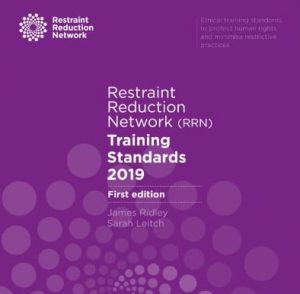Restraint Reduction Network
A coalition of the willing
The Restraint Reduction Network is an independent network which brings together committed organisations providing education, health and social care services. The Network's Patron is Sir Norman Lamb.
The Network has an ambitious vision to reduce reliance on restrictive practices and make a real difference in the lives of people. We achieve this mission by sharing learning and developing quality standards and practical tools that support reduction.
The Network welcomes the increased focus on restraint reduction across the NHS and adult social care in the UK. The over-reliance on Restrictive Practices when supporting vulnerable people who become distressed is an ongoing and significant concern. In recent years, there have been a number of scandals associated with the abuse of such practices, as well as a number of deaths associated with physical restraint.
There is growing recognition among professional bodies and government departments (and arm’s length bodies) that whilst the use of any kind of restraint may on rare occasions be necessary to keep people safe, it is also traumatic and must be minimised in therapeutic settings.
Restraint Reduction Network Training Standards
 The Restraint Reduction Network has worked with Health Education England to produce a set of ethical training standards that protect human rights and support the minimisation of restrictive practices.
The Restraint Reduction Network has worked with Health Education England to produce a set of ethical training standards that protect human rights and support the minimisation of restrictive practices.
The Restraint Reduction Network Training Standards apply to all training that has a restrictive intervention component and will provide a national and international benchmark for training in supporting people who are distressed in education, health and social care settings.
These Standards will ensure that training is directly related and proportional to the needs of populations and individual people and that training is delivered by competent and experienced training professionals who can evidence knowledge and skills that go far beyond the application of physical restraint or other restrictive interventions.
In addition to improving training and practice, the Standards will:
- protect people’s fundamental human rights and promote person centred, best interest and therapeutic approaches to supporting people when they are distressed
- improve the quality of life of those being restrained and those supporting them
- reduce reliance on restrictive practices by promoting positive culture and practice that focuses on prevention de-escalation and reflective practice
- increase understanding of the root causes of behaviour and recognition that many behaviours are the result of distress due to unmet needs
- where required, focus on the safest and most dignified use of restrictive interventions including physical restraint.
It is important they are applied consistently to services:
- across education, health and social care
- across children and adult services
- across the UK and internationally
- for all populations, including people with mental health conditions, dementia, learning disabilities and autistic people in order to consistently minimise the risk of physical and psychological harm to all people in all settings in all nations in the British Isles

